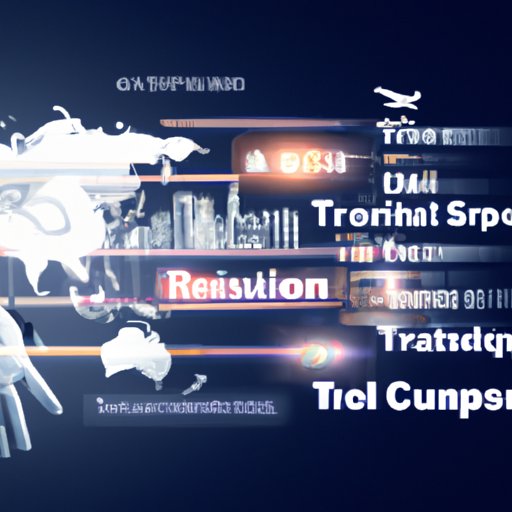Introduction
Globalization is a term used to describe the process of increased integration and interdependence between countries and regions around the world. This process has been driven by advances in technology, which have enabled easier communication and transportation. As a result, globalization has had a significant impact on economies, societies, and cultures across the globe. In this article, we will be exploring how technology has affected globalization, and examining the benefits and challenges it has created.

Exploring the Impact of Technology on Globalization
Technology has played an important role in the globalization process, with advancements in communication and transportation technology making it easier for people to interact and travel across borders. In particular, technology has been key to the growth of international trade, allowing goods and services to be exchanged more quickly and efficiently. According to a study by the World Trade Organization, “Technological progress has been central to the expansion of international trade.”
The use of technology has also made it easier for businesses to establish operations in foreign markets. For example, cloud computing has allowed companies to access data and resources remotely, eliminating the need for physical infrastructure in other countries. This has enabled firms to expand globally without having to invest heavily in overseas offices and facilities.
In addition, technology has enabled greater collaboration between countries. For instance, online platforms such as Zoom and Skype have made it much easier for people in different parts of the world to communicate and work together. This has allowed businesses to share knowledge and resources across borders, creating opportunities for global partnerships and joint ventures.
Investigating the Challenges of Technological Globalization
Despite the many benefits that technology has brought to globalization, there are also some potential challenges. One of the main concerns is the effect that technology has had on cross-border investment. While technology has made it easier for firms to invest in overseas markets, it has also increased the risk of capital flight and currency manipulation.
In addition, technology has raised questions about the security of data and intellectual property. With the rise of cybercrime, companies must take greater precautions to protect their information from malicious actors. This can be costly and time-consuming, and may discourage firms from investing in certain markets.
Finally, there are concerns about the potential for technology to create monopolies or oligopolies in certain sectors. For example, tech giants such as Amazon, Google, and Apple have become dominant players in the global market, raising the possibility of reduced competition and higher prices for consumers.

Understanding the Effect of Technology on Cultural Exchange
Technology has also had an impact on cultural exchange. Social media platforms such as Facebook, Twitter, and Instagram have enabled people to connect with others around the world, allowing them to share ideas and experiences. This has increased awareness of different cultures, and encouraged people to explore different parts of the world.
At the same time, technology has also been used to spread misinformation and stereotypes about other cultures. The proliferation of fake news and biased reporting can lead to misunderstandings and mistrust between people from different backgrounds. It is therefore important to ensure that technology is used responsibly, and that it is not used to spread fear and hatred.
Conclusion
In conclusion, technology has had a major impact on globalization. It has enabled greater international trade and investment, and facilitated collaboration between countries. However, it has also introduced some challenges, including risks to data security and the potential for monopolies. Finally, technology has changed the way people interact with each other, increasing awareness of different cultures but also potentially leading to misunderstanding and mistrust.
Overall, technology has been a driving force behind globalization, and its effects will continue to shape the global economy and society in the years to come. It is therefore essential to understand its implications, and to ensure that it is used responsibly in order to create a more inclusive and equitable global system.
(Note: Is this article not meeting your expectations? Do you have knowledge or insights to share? Unlock new opportunities and expand your reach by joining our authors team. Click Registration to join us and share your expertise with our readers.)
